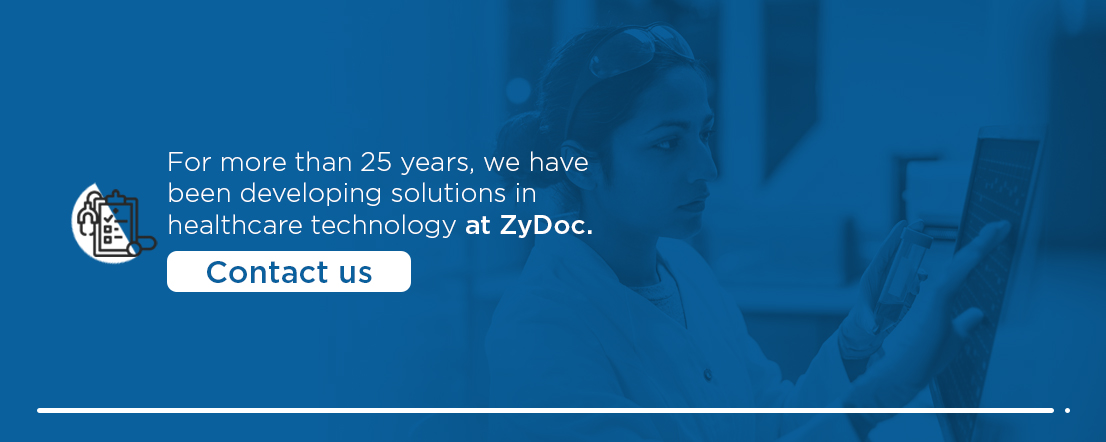Return on Healthcare Tech Investments
Aug 18, 2020 | Jonathan Maisel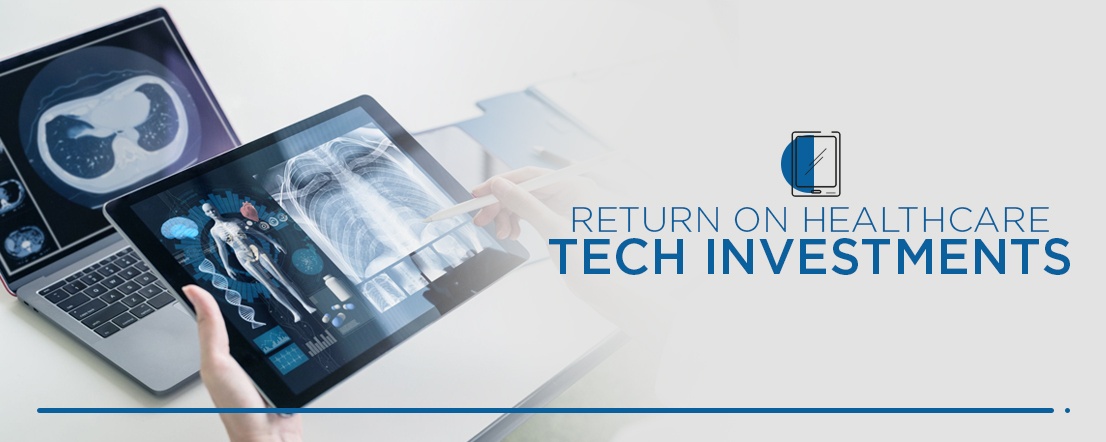
As healthcare facilities deal with increasing technology demands, physicians and healthcare administrators often wonder which investments are worthwhile. When healthcare executives look for solutions for a digital transition, they may be uncertain which investments will have the best return on investment and will handle incoming data most effectively.
Healthcare tech is one of the best investments a practice can make. Some tech options, like digital medical transcription with EHR integration, benefit physicians in nearly every aspect of healthcare. Investing in healthcare technology can make your practice more efficient, among many other advantages.
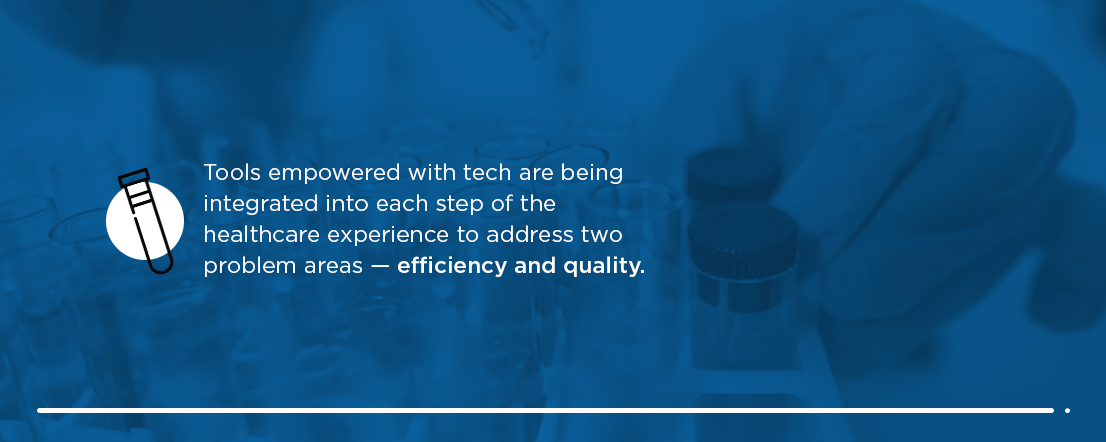
What Is Healthcare Tech?
Healthcare technology — also known as healthcare tech or health tech — refers to the development of technologies that can improve various aspects of the healthcare system, including:
- Administrative and hospital productivity
- Insights into treatments and medicines
- Overall quality of care
Tools empowered with tech are being integrated into each step of the healthcare experience to address two problem areas — efficiency and quality. Thanks to predictive analytics and artificial intelligence, hospitals can be better staffed and waiting times for patients can be reduced. Surgical procedures are also being improved with ultra-precise robots that provide assistance in surgeries.
Healthcare tech has initiated the improvement of hospital operations and expanded access to healthcare. Because there is no single approach to proper care that works for every facility, healthcare tech companies realize customization is key. These companies tailor experiences to individuals, providing a boost of efficiency. Everything from diets to insurance payments can be personalized by healthcare tech companies, which allows for the reduction of strain on the industry and the overall improvement of human health.
Tech-infused care helps to address the following:
- Long wait times
- Skyrocketing costs
- Inefficiencies in the development of drugs
- Limited access to healthcare providers and insurance
The uses for healthcare tech are endless, with tech being implemented at nearly every level, including the following examples.
Fitness
One of the uses for healthcare tech is in the fitness sector, where it has plenty of applications. Hundreds of apps, wearables and other tools have been developed to do everything from measuring sleep schedules to tracking workouts. Each of these healthcare tech developments is intended to increase fitness and reduce preventable healthcare costs.
Drug Development
Another area of use for healthcare tech is drug development. Artificial intelligence and machine learning are fueling drug research and development in the pharmaceutical industry. Healthcare tech tools are being used across the industry in a wide range of ways to help shorten time-consuming tasks. These tasks include everything from identifying patients who would benefit the most from a drug trial to pinpointing chemical combinations that could create the optimal drug.
Administration
Thanks to a variety of tools, applications and software, hospitals are better able to handle increasing administrative workloads. Administrative teams are streamlining patient flow by using artificial intelligence to predict peak busy hours so they can schedule staff and calculate wait times accurately. Apps are also being used to ask patients preliminary questions and prioritize doctors’ schedules so they can use their time effectively.
Diagnostics and Error Reduction
Overdue or incorrect diagnosis is a major problem in the healthcare industry that is now being addressed by a variety of healthcare tech tools. By incorporating healthcare tech into a range of fields, such as pathology and genetics, companies have been able to develop tools that can help detect diseases earlier and with greater accuracy.
Mental Health
Another sector that is benefiting from healthcare tech is mental health. In the fight against PTSD, depression and Alzheimer’s disease, virtual reality has been offering improvement. Patients can gradually build up immunity to traumas through exposure therapy until thoughts about past traumas no longer negatively impact them.
Telemedicine apps have also made access to healthcare professionals and counselors easier by creating open lines of support and communication — along with reducing the wait for in-person appointments during high-stress times.
Surgery
A healthcare sector that has seen some of the most significant tech improvements is surgery. Robots are utilized in a wide variety of operations, including non-invasive, minor and invasive procedures like open-heart surgery. Robotic surgical assistants are made in several shapes and sizes, ranging from small bots that crawl on the surface of a heart to giant arms that function as another pair of hands during a procedure.
In addition to robots, augmented and virtual reality technology can assist surgeons and physicians with performing tasks, such as explaining procedures to patients and practicing new techniques in surgery.
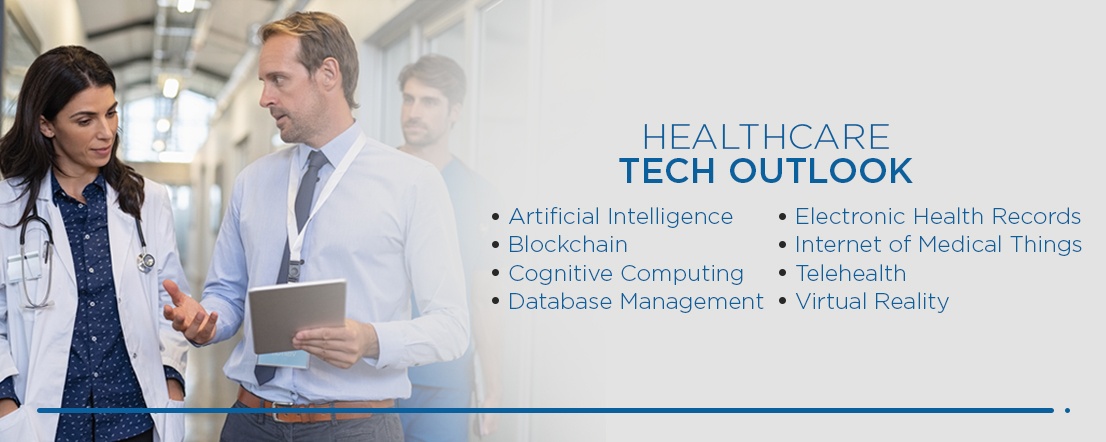
Healthcare Tech Outlook
As healthcare becomes more complex, healthcare technology is evolving to provide new and innovative solutions that allow physicians to better serve patients. What new technologies are best utilized to stay up to date with medical practices that are rapidly changing? What trends are being embraced by medical practices? Below, we cover how healthcare tech affects healthcare practices and how your practice can take advantage of these tech opportunities.
Artificial Intelligence
Artificial intelligence can benefit any practice, large or small, in a variety of ways. The primary goals of artificial intelligence use in the healthcare field include:
- Reduced costs
- Drug research
- Medical research
- Increased efficiency
- Workforce management
- Early diagnosis of disease
Blockchain
Utilizing blockchain may help solve some urgent health issues, such as:
- Managing health data
- Securely transferring health information
- Lowering the market’s counterfeit machines
Blockchain technology is also being utilized to discover ways isolated organizations can access information via a secure channel. For example, though children’s health records need to be kept secure, there are times when these records need to be accessed by parties other than a child’s healthcare practitioners or parents, such as the child’s elementary school.
Cognitive Computing
One of the techniques for handling large volumes of data that changes rapidly is cognitive computing. Cognitive computing involves systems that use pattern recognition, data mining and natural language processing to acquire patient data in real-time.
Cognitive computing is more than an algorithm, and it is used to classify populations, forecast disease onset and predict data patterns like the effect of a drug on individuals or populations. Data can also be combined from disparate sources in cognitive computing to develop new methods for understanding a patient’s condition.
Database Management
Organizations must keep a database up to date and accurate to serve clients. In pharmaceutical research, information is crucial at every stage due to the legal, financial and medical implications. Pharmaceutical clients can benefit from the integration of databases for healthcare, scientific and financial information into a single, unified system.
Electronic Health Records
Perhaps the greatest change in the U.S. healthcare system in the past decade has been electronic health records (EHRs). The market for electronic health records is anticipated to continue growing. By incorporating technologies in artificial intelligence, EHRs allow healthcare facilities to improve and track patient care and to identify more efficient methods for treatment.
Many EHR systems struggle to manage and digitize data in a way that makes it easily accessible and protects privacy. Healthcare tech advancements in digital medical transcription present a great opportunity to address the challenges that EHR systems face.
Internet of Medical Things
Also known as IoMT, the Internet of Medical Things refers to medical applications and devices that are connected to IT systems in healthcare through the web. Wi-Fi enabled devices can facilitate communication between machines and allow for data storage by linking to cloud platforms. Examples of these devices include smartwatches, fitness trackers and smart sensors.
In addition, healthcare practitioners can use these devices to help diagnose some diseases early and improve treatment.
Telehealth
Telehealth allows healthcare practitioners to treat and care for patients with no physical presence needed. Telehealth can help practitioners monitor their patients remotely, which can be especially helpful for:
- Patients who have chronic health conditions
- Oral healthcare monitoring
- Prescription compliance
- Securely sharing patient information with other healthcare practitioners
Virtual Reality
Though they’re in the early stages of affecting healthcare, virtual reality and augmented reality hold a lot of potential to benefit both healthcare practitioners and their patients. Virtual reality technology can allow dentists and surgeons to practice techniques and procedures without needing real patients. Nurses can also benefit from virtual reality training for CPR education and practice.
Patients may use virtual reality to better understand how a surgery is performed and what rehabilitation is needed. Virtual reality may also be useful in pregnancy education for expecting parents. Additional applications include:
- PTSD treatments
- Phantom limb treatments
- Chronic condition therapies
- Brain damage rehabilitation
- Mental health
- Physical therapy
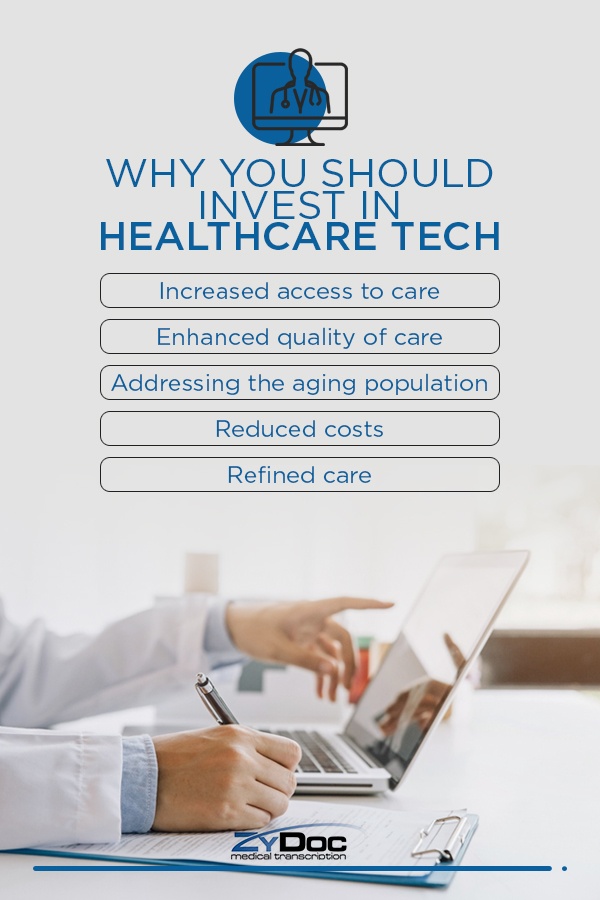
Why You Should Invest in Healthcare Tech
Why is tech such a valuable healthcare investment? Investing in healthcare tech is particularly beneficial for smaller practices. The following are a few reasons why you may want to consider investing in healthcare tech:
- Increased access to care: Healthcare technology can help increase patients’ access to care. Telehealth and virtual care, for example, can improve patients’ ability to access care by allowing them to receive care remotely.
- Enhanced quality of care: By investing in healthcare tech, you can contribute to improvements in patient experience, enhancements in remote patient monitoring, promotions of medication adherence and connections of social determinants to healthcare.
- Addressing the aging population: As patients age, they typically require more medical care. With an expanding life expectancy, the demand for healthcare-related services and products to serve the older population is also increasing. Investing in healthcare tech can ensure the U.S. healthcare system is ready to meet the needs of a growing population of older adults.
- Reduced costs: Healthcare can be a crippling cost for some patients. By investing in healthcare tech, you may be able to help reduce healthcare costs. Healthcare tech can improve operational and clinical workflows, remove waste from the system and enhance clinical trial monitoring and recruitment.
- Refined care: Investing in healthcare tech is an opportunity to change our society. Healthcare tech can positively impact the industry as a whole, improving the lives of both patients and physicians. Patients can receive better care, physicians can be more efficient and the overall healthcare system can become more effective.
Investing in healthcare tech may have a noticeably positive effect on your practice, making the work easier for your physicians and administrative staff and the care better for your patients.
Return on Investment for Healthcare Information Technology
There are several practical ways you can promote an optimal return on investment for your healthcare technology:
- Gradual introduction: If healthcare facilities implement new investments too quickly, the success of each investment may not be utilized to its maximum benefit. Meaningful use guidelines and policies that require clinicians, health systems and hospitals to adhere to a strict set of practices that significantly change their workflow and culture will not create an ideal environment for success. Instead, healthcare facilities should be given an adequate amount of time to adopt new tools.
- Employee training: To get the highest return on investment for your technology, healthcare employees should be trained in using artificial intelligence and data analytics. The effectiveness with which digital investments are managed and utilized could also depend on whether a healthcare company employs a chief digital officer.
- Patience and diligence: Implementing any initial investment can come with a few bumps along the way. However, as long as the healthcare facility employees remain patient, continue searching for ways to improve and learn how to best utilize their healthcare information technology, no investment will be wasted.
- Meaningful use: Return on investment isn’t just about the investment itself — it’s what the industry makes of it. Beyond meeting federal requirements, healthcare facilities should aim to take advantage of their investments and apply them for strategic purposes.
As the quantity of data the industry is attempting to leverage increases, investments into healthcare information technology must also continue to increase. When investments are utilized successfully, costs in the healthcare industry may begin decreasing.
Contact ZyDoc for Medical Transcription & EHR Documentation Services
For more than 25 years, we have been developing solutions in healthcare technology at ZyDoc. We are uniquely qualified to provide physicians with EHR transcription services that are customizable and can meet the everyday requirements of a healthcare facility.
We offer our customers the following services:
- Fast turnaround
- Data encryption
- Quality assurance
- HIPAA compliance
- Transparent pricing
- Ease of use and implementation
- 24/7 customer care and support 365 days a year
- Background-checked, HIPAA-trained staff based in the U.S.
- Integration with hundreds of electronic health record systems
- Mobile solutions that you can access from any browser or device
For a faster, simpler medical documentation method that allows you to use dictation, contact us or start a free 14-day trial today.

